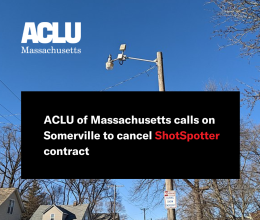
The ACLU of Massachusetts has joined Boston attorney Jeffrey Pyle of Prince Lobel Tye LLP in challenging excessive government secrecy surrounding Massachusetts prosecutors’ use of surveillance letters called “administrative subpoenas” by filing a complaint with the Suffolk Superior Court.
“Our complaint cuts to the heart of the problem with administrative subpoenas in Massachusetts: because they are issued in the shadows and without judicial oversight or accountability, they are the perfect tool for politically-motivated government fishing expeditions,” said Carol Rose, Executive Director at the ACLU of Massachusetts. “This substantial law enforcement surveillance power has for years been exercised almost entirely in the dark, and this case aims to bring some light to it, so the public can have a fully informed and robust debate about the limits of state power in the digital 21st century.”
Prosecutors issue these subpoenas with no judicial oversight, compelling phone companies and internet service providers to hand over users’ communication records revealing extremely sensitive information like who they call and when, banking and credit card details, and internet protocol address logs that can be used to identify someone’s home or business.
Publicly available information about how administrative subpoenas are issued - and to whom and for what reasons - is practically nonexistent, leaving both their targets and the public in the dark. These subpoenas frequently include gag requests asking the companies that receive them not to disclose the existence of the subpoenas to the targets of the surveillance. As a result, targets often never know that law enforcement monitored their private information. The public has a similarly hard time learning even general information about administrative subpoenas, as many prosecutors refuse to disclose even basic information about their use.
The complaint, filed yesterday with the Suffolk Superior Court, seeks to unseal and make public all court files pertaining to a 2011 legal fight over a Suffolk County District Attorney administrative subpoena to Twitter. In December 2011, days after the Boston Police Department shut down the Occupy Boston encampment in Dewey Square, the Suffolk DA issued an administrative subpoena to Twitter, demanding subscriber information for accounts associated with certain user names, proper names, and hashtags like #BostonPD. After Twitter notified him that the government was seeking his account information, an anonymous Twitter user, “John Doe,” represented by the ACLU of Massachusetts, filed a motion to quash the administrative subpoena.
Despite significant public interest in the case, initially all court files were ordered impounded—and for the past five years, the Court has maintained impoundment of nearly all filings in the case.
“Court records are subject to a rigorous presumption of openness,” said Pyle. “The passage of five years has eliminated any potential state interest in continued secrecy, whereas the public has a profound and ongoing legitimate interest in government subpoenas that impinge on the First Amendment right to speak anonymously on issues of public concern.”
“In Massachusetts, the administrative subpoena statute allows prosecutors to monitor the sensitive communications records of people even when they aren’t suspected of a crime,” said Kade Crockford, Director of the Technology for Liberty Program at the ACLU of Massachusetts. “The statute merely says that the records sought must be ‘relevant and material’ to an investigation, meaning you don’t even have to be the target of an investigation in order for a prosecutor to use a subpoena to obtain your records—and there’s no judicial oversight or warrant involved.”
The complaint was filed by Pyle on behalf of Shawn Musgrave, an investigative journalist who has written extensively about the use of social media as a law enforcement intelligence tool, but has been blocked from accessing court files - and by ACLU of Massachusetts on behalf of Nasser Eledroos, a technologist at the ACLU who is working on an administrative subpoena white paper and wishes to include these courts files as a case study. The suit asks the Court to locate and unseal all materials in the Twitter subpoena case.
For more information about the case, click here.
For more information about administrative subpoenas, click here.






